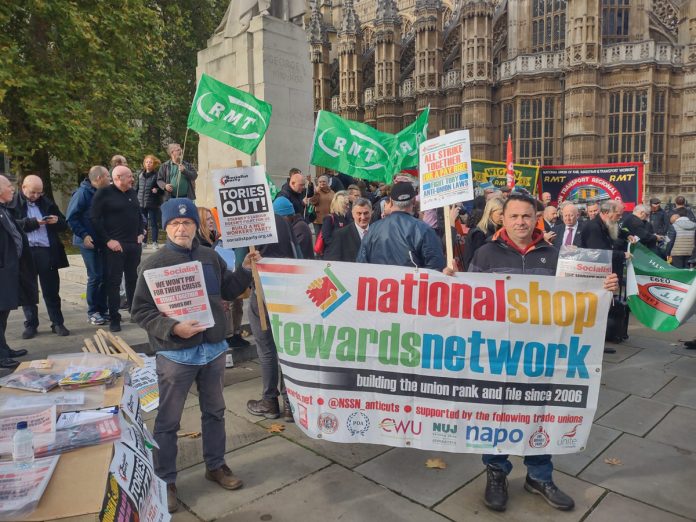“The history of this time will ask: ‘Where were you in 22?’” To cheers from striking UCU members in higher education and Royal Mail workers from CWU, RMT General Secretary Mick Lynch called out Starmer and his New Labour Party for their total lack of support for the growing strike wave.
That strike rally took place on 30 November, eleven years to the day after two million public sector workers, walked out together on what was effectively a 24-hour public sector general strike against the attack on their pensions by the Tory-led coalition with the Lib Dems.
As the year ends, the idea of a 24-hour general strike, of mass coordinated strike action across public and private sectors, is growing. It is fast becoming the Christmas number one of hot topics in the media, particularly of the new right-wing populist internet channels, alarmed by the emerging power of the working class organised in the unions.
In reality, we are already seeing a building, rolling strike of general strike-like proportions. An advent calendar of industrial action is counting down to this Christmas, as workers fight for the pay rise they desperately need to keep the lights and heating on.
The Joseph Rowntree Foundation has estimated that three million households can’t afford to heat their homes, while seven million families have had to forego at least one essential since June. This as the freezing cold winter weather starts to hit.
Inflation
With RPI inflation heading towards 15%, no wonder an ever-growing number of workers are taking to the picket lines. Nurses and ambulance drivers are due to join railworkers, posties, bus drivers, civil servants and even coffin makers! In the new year, firefighters will be ready and hopefully up to half a million teachers.
Three fronts of workers’ struggle are converging. Localised, mainly private sector action has been rising steadily for over a year. This was joined in the summer by national disputes of the rail unions and the CWU in Royal Mail, BT and the Post Office. And now, the public sector unions have been balloting members nationally.
Such is the generalised character of the strike wave, the Tories, the capitalist establishment and the right-wing media are struggling to isolate target groups of ‘greedy’ workers. Some of the Tory press are reduced to pleading poverty on behalf of Sunak’s government and the employers. But with every scandal-filled day, workers are becoming fully aware that this crony capitalist system puts profit for the fat cats first and working-class families to the back of the line.
Such is the crisis within the Tories, that they are split between those who would like to reach some resolution of the strikes, if possible, and those frothing on the backbenches who want Sunak to bring in even more anti-union legislation.
Now it’s the ambulance drivers, nurses and other NHS workers, fighting to grab back some of the 20% income lost over the last Tory decade, who are in the firing line, along with rail and transport workers, for more strike restrictions.
Any such attempt to graft more undemocratic anti-union laws onto those bequeathed by Margaret Thatcher and John Major – maintained by Tony Blair and Gordon Brown – and, more recently, those of David Cameron, must be met by a mass reaction by the unions, including a 24-hour general strike.
But such generalised action is also needed now to win these disputes, which more and more pose the need to force out the Tories, the employer of millions of public sector workers and the political backer of the rail and Royal Mail bosses. The unions have to come together to name the day for such mass joint action.
However, that in turn poses the question: who will stand up for workers politically? Starmer has made it clear that he has chosen a side in these industrial fights – and it’s not ours! Rich ex-Tory donor Gareth Quarry is swapping sides: “I joined Labour because it is a latter-day Blair-type party. If it was still led by its Corbyn wing I would have stopped donating to the Conservatives but I would not have gone to Labour.”
Starmer has spent 2022 sidling up to big business. His refusal to support strikes is the real deal of his political strategy – to be as safe as possible for the bosses and their profits. He has even refused to commit to scrapping any new anti-trade union laws introduced by the Tories.
It would be a mistake for the unions to conclude from this the need to draw back from the political fight. Starmer may be primed to fall into Downing Street, mainly because of the visceral hatred of the Tories, but if a party was established now that represented workers, supported the strikes, had an anti-austerity programme of renationalisations, and was against the privateers, and with backing from at least a section of the unions, it could attract the support of whole sections of workers.
It would also lay down a vital marker in this period of crisis that threatens to sink the Tories and put Starmer’s pro-big business policies to their biggest test. Such a party is needed now, as workers build the biggest strike wave for at least a decade in attempt to find a way out of this cost-of-living nightmare.








